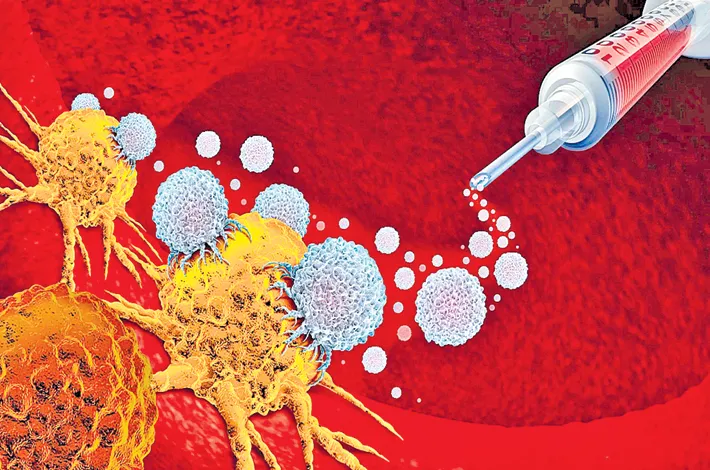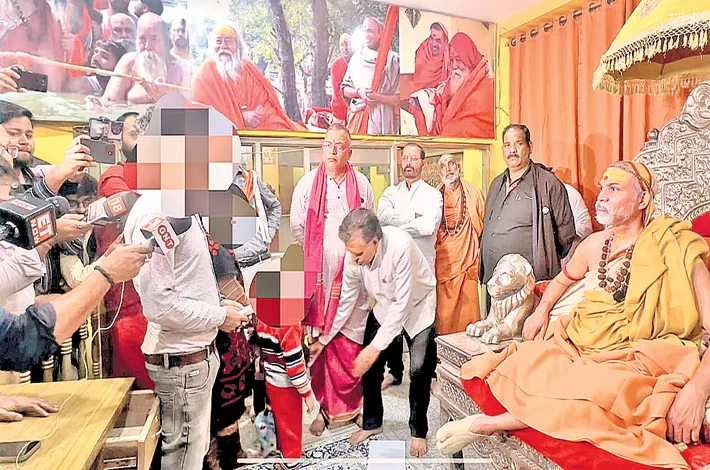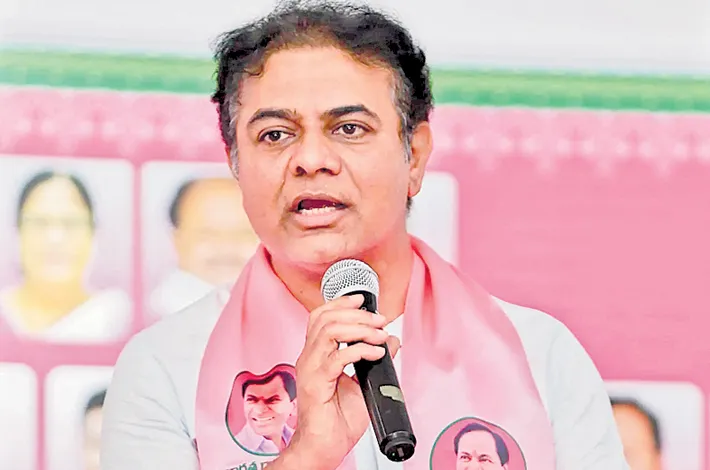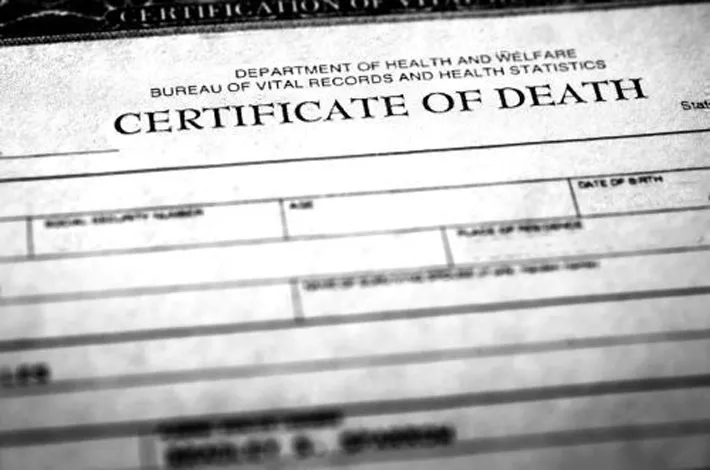At last, Cancer Vaccine arrives!
08-09-2025 12:00:00 AM

Russia announces breakthrough cancer vaccine, set for free rollout for Russians in 2025
- Unlike traditional vaccines that prevent disease, this personalized immunotherapy is designed to treat existing cancers by training the immune system to recognize and attack cancer cells
- Clinical trials are set to begin in mid-2025, targeting patients aged 18 to 75 with confirmed cancer diagnoses
In a historic announcement that has ignited hope worldwide, Russia’s Ministry of Health has declared that a ground-breaking mRNA-based cancer vaccine is ready for clinical use and will be distributed free of charge to patients starting early next year. The news, hailed as a potential turning point in the global fight against cancer, has sparked optimism among patients, families, and medical professionals, even as questions linger about the vaccine’s specifics and efficacy.
The announcement was made by Andrey Kaprin, General Director of the Radiology Medical Research Center of the Russian Ministry of Health, during an interview on Radio Rossiya. “This is a monumental step forward,” Kaprin said. “Our vaccine, developed through years of dedicated research, will be available to every Russian cancer patient at no cost, offering a new weapon in the battle against this devastating disease.”
The vaccine, a product of collaborative efforts among leading Russian research institutions, including the Gamaleya National Research Center for Epidemiology and Microbiology, the Hertsen Moscow Oncology Research Institute, and the Blokhin Cancer Research Center, leverages cutting-edge mRNA technology. Unlike traditional vaccines that prevent disease, this personalized immunotherapy is designed to treat existing cancers by training the immune system to recognize and attack cancer cells. According to Alexander Gintsburg, Director of the Gamaleya Center, preclinical trials in animal models demonstrated the vaccine’s ability to suppress tumor growth and prevent metastases, raising expectations for its potential in human patients.
The promise of a free, accessible cancer treatment has resonated deeply in Russia, where cancer rates have surged, with over 635,000 new cases reported in 2022 alone. Colon, breast, and lung cancers remain the most prevalent, and the prospect of a tailored therapy has brought renewed hope to those affected. “I’ve been fighting breast cancer for two years,” said Irina Petrova, a 42-year-old Moscow resident. “The idea that there’s a vaccine that could help my body fight back, and that it won’t cost me anything, feels like a miracle.”
The vaccine’s development process is as innovative as its purpose. Using genetic material extracted from a patient’s tumor, the vaccine employs messenger RNA (mRNA) to produce proteins that mimic cancer cells, prompting the immune system to target and destroy them. This personalization ensures that each dose is tailored to the unique genetic profile of a patient’s cancer, a method that mirrors similar efforts in the West but stands out for its commitment to free distribution. The integration of artificial intelligence has further accelerated the process, with Gintsburg noting that AI-powered neural networks can design these personalized vaccines in under an hour, a significant leap from the traditionally lengthy process.
Russian President Vladimir Putin, who hinted at the vaccine’s development in February 2024, expressed pride in the achievement. “We are not only advancing science but making it accessible to all,” he said at a recent health forum. “This is Russia’s gift to its people and, potentially, the world.” The government’s pledge to fund the vaccine, estimated at 300,000 rubles (approximately USD 2,869) per dose, underscores its commitment to tackling one of the world’s leading causes of death.
Globally, the announcement has stirred both excitement and cautious skepticism. Cancer, responsible for nearly 10 million deaths worldwide in 2020, remains a complex and multifaceted disease, and experts urge patience until more data is available. “The concept of an mRNA cancer vaccine is scientifically sound and aligns with global research trends,” said Dr. Elias Sayour, a pediatric oncologist at the University of Florida, whose team has tested similar vaccines for glioblastoma. “But without published clinical trial data, we must remain cautious about its efficacy and safety.” Professor Kingston Mills, an immunologist at Trinity College Dublin, echoed this sentiment, noting the absence of peer-reviewed studies in scientific journals. “A breakthrough like this would typically be documented rigorously. We need to see the evidence,” he told Newsweek.
Despite these reservations, the Russian vaccine’s rollout plan is ambitious. Clinical trials are set to begin in mid-2025, targeting patients aged 18 to 75 with confirmed cancer diagnoses. The Federal Medical-Biological Agency (FMBA) chief, Veronika Skvortsova, emphasized the vaccine’s safety, citing three years of testing that showed no adverse effects with repeated use and high efficacy in reducing tumor size and slowing growth. The first patients are expected to receive the vaccine by September 2025, with regulatory approvals anticipated this summer.
For many Russians, the vaccine represents more than a medical advancement—it’s a beacon of hope in challenging times. “My father has lung cancer, and we’ve been told there’s not much time,” said Dmitry Ivanov, a 29-year-old engineer from St. Petersburg. “Knowing there’s something new, something free, gives us a reason to keep fighting.” Social media platforms like X are abuzz with optimism, with users sharing stories of loved ones battling cancer and expressing gratitude for Russia’s initiative. One post read, “This could change everything. Cancer patients deserve this hope.”
Comparisons to global efforts highlight the vaccine’s potential significance. In the UK, BioNTech is collaborating with the National Health Service to provide personalized cancer vaccines to 10,000 patients by 2030. In the US, companies like Moderna and Merck are developing mRNA vaccines for skin cancer, while CureVac’s glioblastoma vaccine has shown promising early results. Russia’s commitment to free distribution, however, sets it apart, potentially addressing disparities in access to cutting-edge treatments.
As the world awaits further details—such as which cancers the vaccine targets, its long-term efficacy, and the logistics of its rollout—the announcement has undeniably shifted the conversation around cancer care. For patients like Petrova and Ivanov, the promise of a free, personalized vaccine offers a glimmer of hope in a battle often marked by uncertainty. “This feels like a new chapter,” Petrova said, her voice tinged with emotion. “I just hope it’s as good as they say.”
While the road to widespread adoption is long, and rigorous clinical trials are still needed, Russia’s bold step has inspired a renewed sense of possibility. As the global scientific community watches closely, the vaccine could mark a pivotal moment in the fight against cancer, offering not just treatment but a vision of a future where such therapies are within everyone’s reach.








